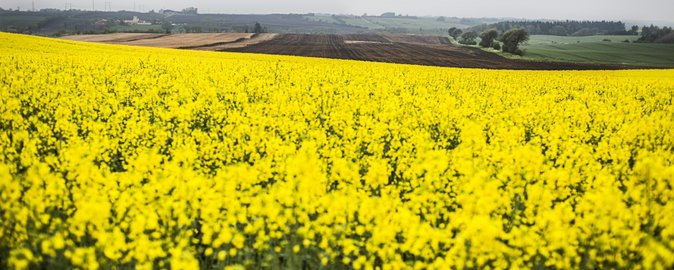- Education
-
Research
Current research
Talent
-
Collaboration
Businesses
Government agencies and institutions
Alumni
-
About AU
Organisation
Job at AU
Mogens Jensen, Minister for Food, is launching ten projects totalling DKK 90 million. Among other things, the projects aim to find solutions to reducing greenhouse gases from agriculture. Researchers from Aarhus University are involved in all ten projects.
2019.09.16 |

“We are facing a global environmental crisis, and Denmark has both the ambition and the ability to take the lead and set a good example. Therefore, we are initiating ten projects within climate research today. The research projects will look for solutions to help make the agricultural sector more climate-friendly,” says the Danish Minister for Food, Mogens Jensen. Photo: Jesper Rais
Can livestock production become more climate-friendly if the cows have certain genes and are fed the right feed? Or does making the agricultural sector more circular, so that livestock production does not only produce milk and meet, but also make energy out of fertiliser and turn grass into protein and pulp into feed by refining it, hold a greater potential? Ten new research projects will help answer these and a number of other questions.
The aim of all the projects is to develop and strengthen our knowledge and to find solutions for reducing greenhouse gas emission from the agricultural sector in the future. DKK 90 million has been allocated to this research initiative in the period 2019 to 2021.
“We’re facing a global environmental crisis, and Denmark has both the ambition and the ability to take the lead and set a good example. Therefore, we’re initiating ten projects within climate research today. The research projects will look for solutions to help make the agricultural sector more climate-friendly,” says the Danish Minister for Food, Mogens Jensen.
Here are the ten projects:
1. Rotation of cattle as a climate tool (AU, UCPH and Seges)
The project is aimed at developing plans for cattle rotation as a cost-efficient means to reducing greenhouse gas emission. The project will provide a scientific basis, ready to be implemented, for calculating carbon storage in the earth and greenhouse gas emission, including the climate impact of grass rotation and nitrification inhibitors, respectively.
2. Aftercrops and green fertiliser for carbon storage and reduction of nitrous oxide emissions (UCPH, AU and Seges)
The project will quantify the potential for using aftercrops as a means for storing carbon and reducing nitrous oxide emissions from Danish agriculture.
3. Possibilities for reducing greenhouse gas emissions from the agricultural sector through extensive operations and set-aside of low-lying land (UCPH and AU)
The project is aimed at improving the data foundation regarding climate impacts linked to the operation and management of set-aside low-lying land, for example through careful biomass production or by regulating water level in order to optimise climate benefit.
4. National emission factors for nitrous oxide from nitrogen fertiliser and crop rotation (AU, UCPH and Seges)
The project is aimed at determining national emission factors for nitrous oxide for relevant fertilisation materials and crop rotation. The project will lead to an improved national overview, but will also provide a basis for determining the effect of reduction strategies.
5. Climate and environmental impact of nitrification inhibitors (AU, UCPH and Seges)
The aim of the project is to quantify the potential for nitrous oxide reductions under Danish conditions, including studying the fate of nitrification inhibitors in the soil, performing eco-toxicological tests and describing the effects on soil organisms after injection of marketed nitrification inhibitors under relevant field conditions with regard to climate, soil type and agricultural practice.
6. INTEgrated Reduction of METhane emissions from livestock fertiliser (AU, DTU and Seges)
The project will develop and document integrated strategies for reducing methane emissions from livestock fertiliser in the entire chain from animal to storage, with a special focus on frequent sluicing.
7. Feeding and Phenotype of the climate-efficient dairy cow (AU, UCPH and Seges)
The project will study the potential for reducing methane emissions associated with the digestion of livestock by using known feed additives, developing new feed additives and determining the phenotype of the climate-efficient dairy cow. The project will also provide tools for documenting methane emissions at farm level.
8. A Novel Greenhouse Gas Mitigation Technology for Livestock Manure Slurry (SDU, AU and Seges)
The aim of the NoGas project is to develop and optimise an entirely new technology for reducing greenhouse gas emissions from manure. The technology will be tested in order to demonstrate its potential, and focus will be placed on making the technology as efficient, cheap and environmentally friendly as possible.
9. CleanMeat and CleanMilk – future sustainable food production (AU)
The project is aimed at developing methods and know-how within the production of artificial meat.
10. Circular agriculture: Systems analysis of green biomass for food, feed and energy (AU and UCPH)
The aim of the project is to develop expertise within the field of systems analysis, to develop and program a model and to carry out a holistic analysis of selected circular biomass systems. The model can be used to asses the potential of new technologies, production systems and tools in general.
A total of 27 applications were submitted. They were assessed by a review committee consisting of five researchers and a secretariat with employees from the Ministry of Environment and Food of Denmark and the Danish Ministry of Climate, Energy and Utilities. The applications were also assessed by Innovation Fund Denmark. The research initiative is part of the agreement on the distribution of the research reserve funds for 2019.
Read the full press release from the Ministry of Environment and Food of Denmark